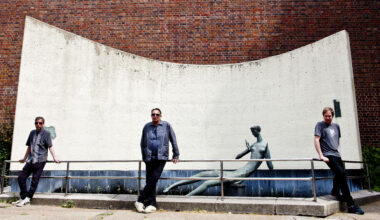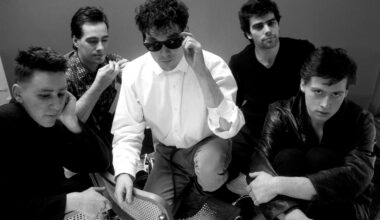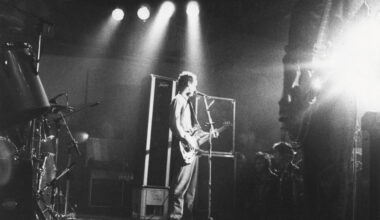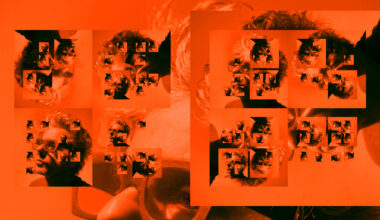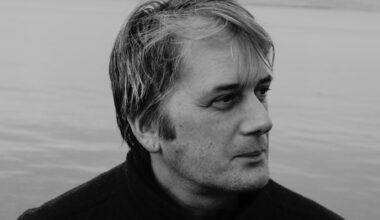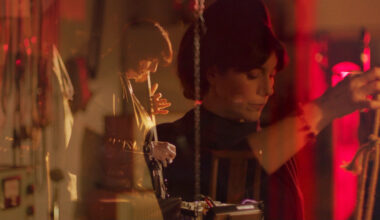What’s in a name? Quite a lot it’d seem if you are as misunderstood as Fujiya & Miyagi, whose warm, thrumming tunes are… well, what? we do our best to get to the bottom of the whole thing
“If there’s one thing we could change,” sighs Fujiya & Miyagi’s Dave Best with a genuinely maudlin air, “it would be our stupid name. I really don’t think it’s done us any favours. I guess we didn’t have any expectation that anyone would even listen to us, and so it didn’t really matter what we were called.”
Hearing one of the founding members of a band regret their choice of identity is unusual, but Fujiya & Miyagi are anything but ordinary. Founded by Best and Stephen Lewis in the late 90s, this is a group that were genuinely (and perhaps forgivably) mistaken for a Japanese outfit; a band who sing about perfectly English concerns like Belisha beacons, the provincial town of Leamington Spa and tripping over shoelaces; a band who confused the life out of the listening public with 2006’s, ‘Transparent Things’. In hindsight, and now upon its recent release on vinyl for the first time, it’s a record that feels like a criminally-overlooked gem.
First up, let’s deal with the name. Fujiya is a brand of beyond-hip turntables manufactured in Japan, not to mention a well-known chain of restaurants and confectionery stores. Miyagi, as if it needs explaining to anyone growing up in the 1980s, comes from Kensuke Miyagi, the fly-catching sensei played by Pat Morita in the original ‘Karate Kid’ films. Anyone looking for some seismically mysterious significance behind Lewis and Best concatenating these two things is on a fool’s errand.
“When we picked the name it was 1997 or 98, and there were lots of producers who worked as duos,” recalls Lewis. “We weren’t planning to be a band; we were going to be producers, so that’s why we just picked two names.”
“The Beastie Boys also had their Japanese robot fixation around the same time, so that fed into it too,” adds Best. “I also remember that half the boys at school had their parkas up like they were pretending to be ET, and the other half were trying to be Mr Miyagi. Fujiya & Miyagi sounds nice, but it’s kind of nonsensical. We’ve never even been to Japan.”
Despite being booked to play their first gig at a Japanese night in London, and some residual confusion that persists to this day, the name stuck. Success, however, didn’t. Fujiya & Miyagi delivered their debut album, ‘Electro Karaoke In The Negative Style’, in 2002 and it barely registered. Pundits seemed confused by the combination of electronics and sinewy pre-punk Germanic rock music, leaving Best and Lewis frustrated by the experience.
“I personally got swayed by reviews that were quite negative so I stopped reading them,” admits Best.
Secondly, let’s deal with that curious Englishness. For Best it’s an entirely natural idea.
“I hate it when British people sing in American accents,” he says. “How do you avoid it? Well, one, don’t do it, and two, talk about really English things. As a kid, I loved Madness, and later on I loved The Kinks and The Fall, and they were all being British and weren’t trying to be anything else. That all fed into it. It means we’ve got a very inauthentic name, but maybe our roots are quite authentically us.”
Low expectations carried the duo into what would become ‘Transparent Things’. Now signed to the Tirk label, the pair released a series of three two-track 10-inch singles recorded over a period of three or four years. The duo always had in mind that these tracks would form an album at some point, and despite the time over which they were recorded, as a whole, ‘Transparent Things’ does have a remarkable coherence.
“It was recorded during a period where we were using the same equipment,” says Lewis, by way of explanation. “Some of those songs had been around for a while, so it was four years of us being a bit crap and having songs, but not being sure how we were going to present them. It took a long while for us to figure out how we wanted to do this.
“As a producer, I didn’t know as much then as I do now and that’s quite a nice thing. It meant that I was forced into using what little equipment I had at that time, and I think it helped bring that sound of the album together.”
“We didn’t have an expectation that we’d have an audience,” adds Best, “which means there’s a purity to what we did on ‘Transparent Things’, you know, a sort of really naive, nice, pure thing that is ultimately quite endearing.”
Starting with the languid double whammy and almost baggy shapes of ‘Ankle Injuries’ and ‘Collarbone’, ‘Transparent Things’ is an arresting proposition from the off. They may have been created from the limited palette that their particular style and constrained kit gave them, but they nevertheless have a sense of purpose and polish. As appealing as their self-crafted musical backdrop might be, it’s Best’s vocals that really grab you, both in their semi-whispered form, and also because of their seemingly impenetrable content. ‘Ankle Injuries’ talks about scraps of jazz mags and ‘Collarbone’ deploys the childhood song about the skeletal structure (“Toe bone connected to the ankle bone / ankle bone connected to the shin bone”) like it always belonged in this context.

“They generally make sense to me,” laughs Best, of his lyrics. “I used to write loads and loads of notebooks which, when I look back at them, seem like the work of Jack Nicholson’s character in ‘The Shining’. It’s the same song written over and over again, reducing over and over until it finally ends up as just one or two lines.
“Often they would just start with a small idea, like ‘Ankle Injuries’ was about a loss of innocence. I remember walking to school when I was about 11 or 12 and it seemed there were always porno mags in bushes, so that was the basis of that song. It also talks about my favourite footballer and a knee injury, rather than the ankle injury the title suggests, because that just sounded better.”
Much of ‘Transparent Things’ is similarly nostalgic, but ‘Photocopier’, with its wry line, “We were just pretending to be Jap-on-ese” (delivered with precisely that deliberately skewed pronunciation) was completely different; a jumble of ideas that seemed fully unconnected.
“‘Photocopier’ was all the lines I had left over,” admits Best, sheepishly. “They’re like non-sequiturs. I’d read quite pompously that Bob Dylan did that with ‘A Hard Rain’s A-Gonna Fall’, so I thought, ‘Well, I’ve got a load of stuff left over to use that might work’. I was always scribbling stuff down, so a lot of the pronunciation was deliberately weird. I don’t speak like that, clearly, but that’s how I wrote it on the page, and so that’s how I sung it. I’m a little bit more coherent now than I was then.”
The elephant in the room when assessing ‘Transparent Things’ is that the band fully co-opted the essential fabric of krautrock, much to their endless frustration. While tracks like ‘Conductor 71’ do hark back to, say, the first Neu! album with those chugging, ‘Autobahn’-inspired rhythms and icicle-sharp synth melodies, the duo are at pains to distance themselves from being a pastiche of what was coming out of Germany some 30-odd years previously.
“At the time, I didn’t think it was like that at all,” protests Lewis. “I was into Stereolab and that sort of 90s stuff, so it wasn’t such a new thing to me. We were in our early 30s when we made ‘Transparent Things’ and we hadn’t listened to that much Germanic music. But I suppose you’ve always got bands that do that German thing – there’s always someone new doing it. Our music often got compared to Can, but if you listen to a Can album, there’s polyrhythms and strange time signatures, and we couldn’t really go down that road if we’d tried.”
Best adds that the pair were more influenced by artists like Prince and early 80s, ‘Let’s Dance’-era David Bowie, while tracks like ‘Photocopier’ and ‘In One Ear & Out The Other’ portrayed the awkward funk influence of Talking Heads, particularly with Best’s languid guitar playing.
Despite the protests about the Can comparisons, Best does concede something of an influence on his vocal; “Damo Suzuki was my big hero,” he admits. Suzuki, a Japanese émigré who Can famously recruited after hearing him busking, perfected an idiosyncratic, half-spoken vocal technique filled with oblique wordplay. The title track from ‘Transparent Things’, in particular, clearly nods to Suzuki’s work on Can tracks like ‘Spoon’. But there was another influence on Best’s vocal style…
“Serge Gainsbourg was a massive influence,” he says. “I love it when people don’t sing but whisper, and I thought, ‘I can do that – I can’t sing, but I can whisper’.”
‘Transparent Things’, largely through the absence of an immediate reaction, left the pair just as confused as before they started it.
“We really struggled after it was released first time round,” says Best. “Partly because our aesthetic was quite minimal, and also because my vocal abilities are pretty narrow, which I have begun to see as a positive. I feel that within that aesthetic and framework we can go anywhere we want to.”
“I feel more confident approaching records now,” adds Lewis. “There was a period after ‘Transparent Things’ and its follow-up, ‘Lightbulbs’ where we were a bit insecure, and that has an impact on how you approach an album. It can be negative, but it can be positive too. Nowadays I just don’t give a shit.”
Last year, Fujiya & Miyagi’s self-titled long-player saw them experimenting with a much more dancefloor-friendly, Italo disco-inspired framework, wherein Best’s vocal is less a Suzuki/Gainsbourg whisper and more like Art Brut frontman Eddie Argos’ wry observations on his surroundings.
“We just wanted to make a joyful record,” says Best. “But just as we released it, the whole world went nuts. That made us think that this type of record isn’t really relevant right now. Brexit happened. Trump happened. It’s like it conspired against us. But for me, despite that, it feels like classic Fujiya & Miyagi.”
‘Transparent Things’ is out on Impossible Objects Of Desire

